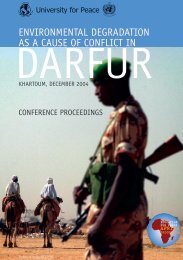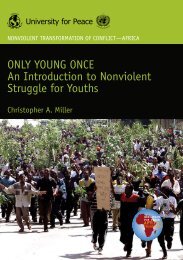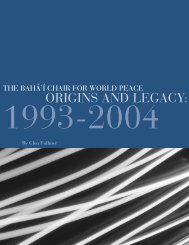who medicines strategy - libdoc.who.int - World Health Organization
who medicines strategy - libdoc.who.int - World Health Organization
who medicines strategy - libdoc.who.int - World Health Organization
You also want an ePaper? Increase the reach of your titles
YUMPU automatically turns print PDFs into web optimized ePapers that Google loves.
WHO MEDICINES STRATEGY 2004-2007 | 104EO 6.5Use of substandard and counterfeit<strong>medicines</strong> reduced as a result ofthe development and applicationof effective strategies to detectthe existence and combat theproduction and circulation of suchproductsRationaleGovernments have to regulate the manufacture,import, export, distribution, and supply of<strong>medicines</strong> in order to ensure that the productsused are safe, effective, of good quality, andrationally used. To achieve this, governmentshave to establish strong national regulatoryauthorities with adequate human, financial andother resources, and an adequate legal basis.The regulatory authorities effectively controlthe market through measures such as theestablishment of a mandatory licensing system forcompanies and products; inspection of premises;and post-marketing surveillance activities. Itis estimated that about 30% of WHO MemberStates, most of them low-income countries, haveeither no national regulatory system or one that isnot functioning well. As result, in many of thesecountries 20%-30% of samples collected frommarkets fail quality tests. The use of substandardor counterfeit <strong>medicines</strong> may cause damage tohealth, treatment failure or death, and in thelong term lead to the waste of scarce resources.Moreover, treatment with ineffective <strong>medicines</strong>such as antibiotics leads to the emergence ofantimicrobial resistance, which may effecta wide section of the population. Efforts tostrengthen medicine regulation will help improveimplementation of regulatory requirements andstandards by manufacturers and distributors andthereby contribute to the reduction of substandardand counterfeit <strong>medicines</strong>.ProgressWHO develops and distributes standards,norms, and guidelines to Member States to helpthem regulate the manufacture, importation,and distribution of <strong>medicines</strong>. WHO has alsoprovided guidance, technical assistance, andtraining to medicine regulatory authoritiesto help build national regulatory and qualityassurance capacity. More specifically, in thearea of counterfeit <strong>medicines</strong>, WHO hasdeveloped guidelines for combating counterfeit<strong>medicines</strong>, organized <strong>int</strong>ercountry, regional, and<strong>int</strong>ernational workshops and training courses,and has undertaken advocacy activities to makegovernment decision-makers and the publicaware of the problem of counterfeit <strong>medicines</strong>. Inthe Greater Mekong Subregion (GMS) countries(Cambodia, China, Lao PDR, Myanmar, Thailand,and Viet Nam) WHO recently launched a specialprogramme to combat counterfeit <strong>medicines</strong>.WHO has also supported post-marketing qualityassessment activities in a number of countries togather information on the quality of products.











